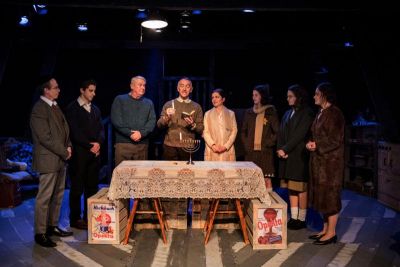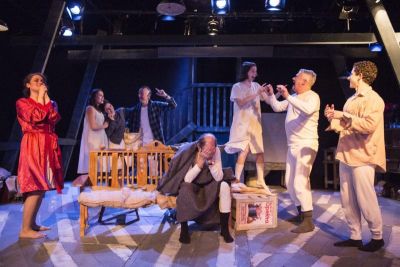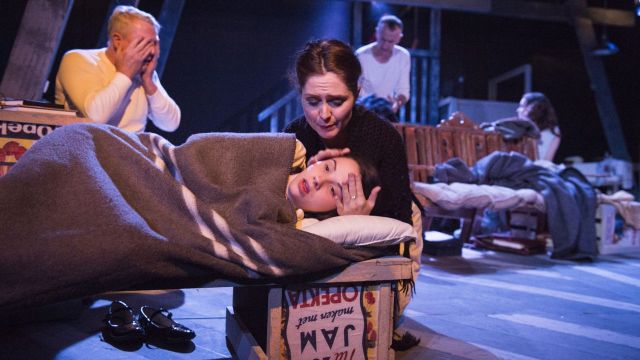Acting The Truth
For writers and actors it’s been a challenge since Shakespeare made up Richard III. How do you play an invented character who’s an inaccurate version of a real life one standing there in the wings? Martin Portus explains the dilemma from his vantage point, on stage in the world’s best known Holocaust play.
Poor Richard may have been freshly unearthed but he long ago lost that propaganda war.
He’s doomed to be always the hunchbacked villain.
For actors, it’s a sharper problem when we play characters based on people still alive, with a living reputation at stake or freshly grieving relatives clamouring for accuracy.
Take The Diary of Anne Frank, the hit 1950’s play about eight, very real Jewish people who almost survived the holocaust by hiding in an Amsterdam attic. In a current New Theatre production in Sydney, I’m playing the “crotchety dentist” Dussel. For two years he shared a tiny attic bedroom with our famous teenage diarist. They didn’t get on.
 Hitler’s most famous victim, the teenager later dubbed by Time magazine one of the 20th Century’s most influential people, certainly had the last word. And on Dussel especially.
Hitler’s most famous victim, the teenager later dubbed by Time magazine one of the 20th Century’s most influential people, certainly had the last word. And on Dussel especially.
Dussel joined Anne, her sister, Margot, and parents, Edith and Otto Frank, and the Van Daans and their son Peter in that annex attic in 1942, months after the others had been in hiding. In her diaries, Anne quickly dubbed her roommate exasperating, egotistical and a ridiculous old fool.
Dussel wasn’t even his name but one conjured up by Anne when she started revising her diary. Her inspiration was a BBC broadcast saying wartime diaries would be invaluable as records – and published works! – when peace returns. Dussel in German variously translates as bozo or idiot.
And so every night, the ghost of the real Mr Dussel – a certain Fritz Pfeffer – whispers to me from the wings.
Everyone but Otto - Anne, Dussel and the rest – were exterminated by the Nazis in the months following their raid on the attic on August 4, 1944.
The crashing arrival of the Nazis (offstage) is the climax of the play by Francis and Albert Hackett. Under the careful eye of Otto Frank, this American middle-aged couple, with a few comic successes behind them, drew their story directly from Anne’s diary.
Even by then in 1953, Otto’s selectively edited version of the diary had created publishing history across America, Europe and Japan. Voiced by an optimistic teenage victim, here was the first post-war work to deal with the holocaust. The Anne Frank industry was off and running – and so too was the mis/representation of my poor old Mr Dussel.
The playwrights though went still further by using Mr Dussel as a vehicle of welcome comic relief. The result was an elderly, bumbling fusspot, impatient and selfish, and always greedy for the biggest slice of cake. The Hacketts had to create an uplifting play about the holocaust which was digestible for American audiences – and Dussel’s buffoonery helped the process.
Indeed, comic actor Ed Wynn played Dussel in the 1959 film of the play, and was nominated for an Academy Award. The film was not a critical and commercial success but it did win three Oscars. As for the play, amongst other awards, it won the Tony for Best Play and the Pulitzer Prize, was translated into dozens of languages and continues to be staged around the globe.
Both the film and the play also minimise talk in Anne’s diary of specifically Jewish suffering (and practices) and, with Otto’s agreement, universalises the story into a post-war plea for a more general tolerance.
To this purpose, Mr Dussel was further transformed into a secular Jew more familiar with the Dutch Catholic practices of St Nicholas Day than the Jewish ritual of Hanukkah. For the real Mr Dussel – Fritz Pfeffer – this may be the greatest insult. He was, in fact, one of the most devoutly orthodox Jews in that attic, certainly far more than the liberal Otto Frank.
 The Hacketts defended this theatrical invention: they needed an uninformed questioner in that attic to be the means of explaining Jewish ritual to the audience.
The Hacketts defended this theatrical invention: they needed an uninformed questioner in that attic to be the means of explaining Jewish ritual to the audience.
So who then was the real Mr Dussel?
Fritz Pfeffer was a fit and somewhat debonair, intellectual and professional. A divorcee with custody of his beloved only child, he escaped Berlin after the notorious Kristallnacht attacks and got his boy safe passage to Britain. He instead sought haven in Amsterdam because his English was poor and a possible job in Britain would not recognise his religious observance of the Sabbath.
In Amsterdam Pfeffer lived with a considerably younger Catholic woman, Lotte Kaletta, until anti-Jewish laws in the occupied Nederlands made such unions illegal and they were forced to live apart. Lotte never knew where Pfeffer later went into hiding but they continued to exchange letters and she sent him food and presents. A decade after his death at Neuengamme concentration camp in 1945, at the age of 56, Lotte married him posthumously.
And like Fritz’s son, Peter, who immigrated to America, Lotte continued to protest at the portrayal of her husband in Anne Frank diaries and in the subsequent film, play and wealth of other TV serials and documentaries.
Lotte was once close to Otto, especially when he returned alone from Auschwitz, as well as the heroic Dutch supporters who had provided for their friends in the attic. But she broke contact with everyone over this treatment of Fitz Pfeffer. Much of the written records, however, the now many histories, biographies and memoirs of those with some link to the Anne Frank story bear witness to who Mr Dussel really was.
 Increasingly isolated, Lotte died in her cluttered Amsterdam flat in 1985. Her possessions were deposited at the city’s Waterlooplein flea market but by chance an employee of the Anne Frank Stichting (Museum) noticed them. And so Lotte’s treasured collection of books, letters and photos documenting the warmth and humanity of her “Mr Dussel” were preserved.
Increasingly isolated, Lotte died in her cluttered Amsterdam flat in 1985. Her possessions were deposited at the city’s Waterlooplein flea market but by chance an employee of the Anne Frank Stichting (Museum) noticed them. And so Lotte’s treasured collection of books, letters and photos documenting the warmth and humanity of her “Mr Dussel” were preserved.
Curiously, many are on display this year in a current exhibition at the Frank Museum devoted to the true story of Fritz Pfeffer. In April, his two middle-aged grandsons flew from America to pay tribute to the man at its opening.
Meanwhile in Sydney, as directed by Sam Thomas, I must play the Mr Dussel as written in the play and as drawn from Anne’s diaries. But we have worked to give him an added dignity and a rigour of purpose. I have him busy cleaning his dental tools or studiously learning Spanish (as Pfeffer kept himself busy preparing for a post-war life with Lotte in South America).
Some nights, when my comic skills are well oiled and the laughter keeps coming, I’m uncomfortable and want to call a halt to the silly gags. In the wings, the real Mr Dussel is there and he deserves better.
Originally published in the July / August 2015 edition of Stage Whispers. Read More.
Photographer: Matthias Engesser.
Subscribe to our E-Newsletter, buy our latest print edition or find a Performing Arts book at Book Nook.

